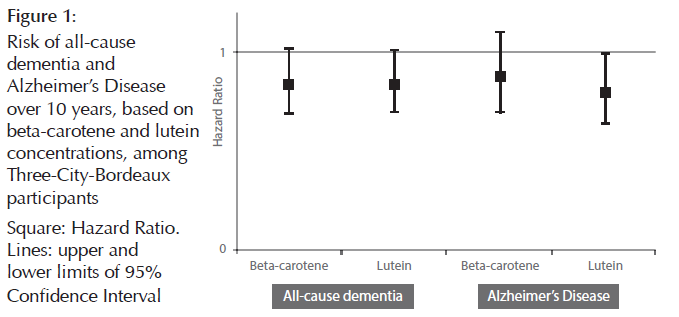Higher lutein levels and lower risk of dementia
Nutrition as a promising strategy to post-pone cognitive decline
In the field of prevention of age-related cognitive decline, several nutritional strategies have been explored and diets rich in plant foods, i.e. fruits, vegetables, legumes, nuts and cereals, such as the Mediterranean diet, seem highly promising. However, the contribution of each class of nutrients to the protective effects of plant foods on cognition is still poorly understood. Vitamins C and E, polyphenols and carotenoids seem the most interesting nutrients although mixed results have been reported regarding the risk of all-cause dementia or Alzheimer’s Disease (AD) to date.
Biological nutrient status as a surrogate of nutrient intake
Circulating nutrient status is affected by dietary intake, but also by interindividual differences in bioavailability and metabolism. Surprisingly, few studies have yet investigated the link between circulating nutrients, including carotenoids, and age-related cognitive decline or dementia risk. Case- control studies persistently reported lower circulating levels of carotenoids among demented people, while cross-sectional studies suggested that appropriate levels of beta-carotene, lycopene, lutein, and/or zeaxanthin were associated with better cognitive performances among elderly people. Because of the long prodromal phase of dementia, only longitudinal studies with relatively long follow-up could ensure that the observed exposure precede the outcome. To date, few longitudinal studies of the association between plasma carotenoid concentrations and cognitive decline have been published and showed conflicting results1-2.
Carotenoids concentrations and risk of dementia: epidemiological evidence from the Three-City-Bordeaux study
Recently, we aimed to focus on the risk of all-cause dementia and AD over 10 years in relation to plasma concentrations of various carotenoids.
The study sample consisted of 1092 participants from the Three-City-Bordeaux study, an ongoing prospective cohort study of vascular risk factors of dementia. These participants, free of dementia at baseline, aged 74.4 y on average, have been re-examined every two years over 10 years. A clinical exam allowed to perform the diagnosis of dementia / AD. The baseline concentration of plasma carotenoids (beta-carotene, alpha-carotene, lycopene, lutein, zeaxanthin and beta-cryptoxanthin) was determined using high-performance liquid chromatography, by DSM Nutritional Products.
In both incident cases of dementia and in control participants, twothirds of plasma carotenoids were composed of carotenes, mainly
beta-carotene. Lutein and beta-cryptoxanthin were equally represented among total xanthophylls (44% of each on average).
After adjustment for socio-demographic, genetic and clinical variables, the plasma total carotenoids, beta-carotene, total xanthophylls and zeaxanthin concentrations were not individually statistically associated with the risk of all-cause dementia. Regarding plasma lutein, a trend for an inverse association was observed: higher lutein concentrations were associated with a borderline reduced risk of dementia (up to 16%) (Figure 1). Regarding the etiology, only an increase of plasma lutein was significantly associated with a 21% lower risk of AD in fully adjusted analyses (Figure 1).

In this study, we reported the specific importance of lutein, among all carotenoids, assessed as a biomarker of consumption. The potential underlying mechanisms of action of carotenoids more generally may be due to their antioxidant properties although other mechanisms, such as anti- inflammatory functions, the modulation of functional and structural properties of synaptic membranes, regulation of cell growth, enhancement of gap junctional communication, could also partly contribute to their brain beneficial biological actions3-4. Moreover, several data have suggested that lutein and zeaxanthin were important contributors of the maintenance of brain functions3. Lutein and zeaxanthin are preferred carotenoids in the human brain, contributing to more than two thirds of total brain carotenoids, are mainly present in regions vulnerable to AD and a potential anti-amyloid effect of betacarotene has even been suggested.
A step forward
In the field of carotenoids, few interventional studies have examined the preventive role of lutein or beta-carotene in mild cognitive impairment and AD, and provided mixed results to date5-6. The replication of the associations observed in our study is warranted, especially using biomarkers. Nevertheless, data about dietary intake of F&V have also underlined that a higher intake of vegetables, notably green leafy vegetables, but not fruits, was associated with a decreased risk of dementia or cognitive decline7. A specific dietary pattern, including explicitly green leafy vegetables, has even been proposed as a dietary model that provides better protection against dementia8. To date, the take-home message is that further researches about dietary habits are still required for improving the brain health of older adults before elaborating dietary recommendations.
References
1. Hu P, Bretsky P, Crimmins EM, Guralnik JM, Reuben DB, Seeman TE. Association
between serum beta-carotene levels and decline of cognitive function in high-functioning
older persons with or without apolipoprotein E 4 alleles: MacArthur studies of successful
aging. The journals of gerontology. Jun 2006;61(6):616-620.
2. Kang JH, Grodstein F. Plasma carotenoids and tocopherols and cognitive function: a
prospective study. Neurobiology of aging. Sep 2008;29(9):1394-1403.
3. Johnson EJ. A possible role for lutein and zeaxanthin in cognitive function in the elderly.
The American journal of clinical nutrition. Nov 2012;96(5):1161S-1165S.
4. Obulesu M, Dowlathabad MR, Bramhachari PV. Carotenoids and Alzheimer’s disease: an
insight into therapeutic role of retinoids in animal models. Neurochemistry international.
Oct 2011;59(5):535-541.
5. Grodstein F, Kang JH, Glynn RJ, Cook NR, Gaziano JM. A randomized trial of beta
carotene supplementation and cognitive function in men: the Physicians’ Health Study II.
Archives of internal medicine. Nov 12 2007;167(20):2184-2190.
6. Johnson EJ, McDonald K, Caldarella SM, Chung HY, Troen AM, Snodderly DM. Cognitive
findings of an exploratory trial of docosahexaenoic acid and lutein supplementation in
older women. Nutritional neuroscience. Apr 2008;11(2):75-83.
7. Loef M, Walach H. Fruit, vegetables and prevention of cognitive decline or dementia: a
systematic review of cohort studies. J Nutr Health Aging. Jul 2012;16(7):626-630.
8. Morris MC, Tangney CC, Wang Y, Sacks FM, Bennett DA, Aggarwal NT. MIND diet
associated with reduced incidence of Alzheimer’s disease. Alzheimers Dement. Sep
2015;11(9):1007- 1014
